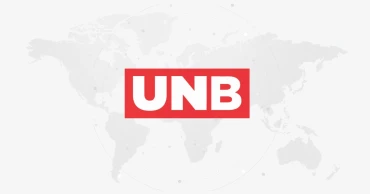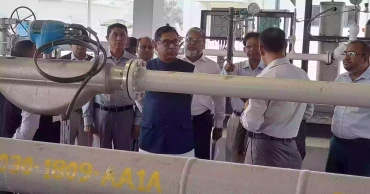Indo-Bangla Friendship Pipeline
Hasina, Modi inaugurate ‘Indo-Bangla Friendship Pipeline’ to boost energy cooperation
A 131.57-kilometre cross-border 'Indo-Bangla Friendship Pipeline' was inaugurated on Saturday as part of cooperation in energy sector between the two neighbouring countries through which Bangladesh will import petroleum products, especially diesel from India.
Prime Minister Sheikh Hasina and her Indian counterpart Prime Minister Narendra Modi formally inaugurated the newly built pipeline.
Hasina was connected from her official residence Ganabhaban while Modi was connected from his office in New Delhi.
Of the pipeline, 126.57 kilometres are in Bangladesh while the remaining 5 kilometres have been installed in India.
The BPC, the state agency under the Energy and Mineral Resources Division, has been implementing the project under a 15-year deal with India to annually import 250,000 tonnes to 400,000 tonnes of diesel from the neighbouring country through the cross-border pipeline.
The deal was signed in 2017 following the approval of the Cabinet Economic Affairs Committee on August 23.
Bangladesh annually needs to import 6.6 million tonnes to 7.7 million tonnes of diesel to meet its demand.
According to official documents, the whole consignment of petroleum will come through the cross-border pipeline from India's Numaligarh refinery, located in Golaghat in north-eastern Indian state of Assam, while Bangladesh will receive it at Parbatipur petroleum fuel depot in the north-western district of Dinajpur.
Read more: Bangladesh-India Friendship Pipeline to vastly improve transport of diesel: New Delhi
Official sources said though most part of the proposed pipeline is to be laid in the Bangladesh part, the Indian government has provided about Rs 303 crore as a loan under Indian line of credit (LOC) to build the Bangladesh portion.
Bangladesh will operate the pipeline in its part while India will operate the pipeline in its portion.
The documents also reveal that Bangladesh will annually import 250,000 tonnes in the first three years, 300,000 tonnes annually in the 4th to 6th years, 350,000 tonnes annually in the 7th to 10th years and 400,000 tonnes annually from the 11th to 15th year.
Currently, Bangladesh has been importing 22,000 tonnes of diesel per month using railway wagons.
The deal could be extended for a further period of time.
Such petroleum imports from India through cross-border pipelines will help create a stock of petroleum in the northern region to meet the growing demands in that part of the country.
Indian Ministry of External Affairs on Friday said that the operation of the Bangladesh-India Friendship Pipeline will put in place a sustainable, reliable, cost-effective and environment-friendly mode of transporting fuels from India to Bangladesh.
It will further enhance cooperation in energy security between the two countries.
This is the first cross-border energy pipeline between India and Bangladesh, built at an estimated cost of Rs 377 crore, of which the Bangladesh portion of the pipeline built at a cost of approximately Rs 285 crore, has been borne by the government of India under grant assistance.
The Pipeline has a capacity to transport 1 million tonnes per annum of High-Speed Diesel (HSD).
It will supply HSD initially to seven districts in northern Bangladesh.
2 years ago
Newly-built 'Indo-Bangla Friendship Pipeline' ready for inauguration
The newly built 130-km Bangladesh-India Friendship Pipeline for carrying diesel or petroleum is ready for inauguration.
According to official sources, Bangladesh Prime Minister Sheikh Hasina and her Indian counterpart Prime Minister Narendra Modi are scheduled to formally inaugurate the 131.57-km cross-border pipeline through video conferencing on March 18.
Named 'Indo-Bangla Friendship Pipeline', some 126.57-km of the pipeline lies in Bangladesh while the remaining 5-km was installed in India.
“All the necessary works of the pipeline project were completed and it’s now ready for inauguration,” ABM Azad, chairman of Bangladesh Petroleum Corporation (BPC), told UNB.
The BPC, the state marketing agency of petroleum fuel under the Energy and Mineral Resources Division, has been implementing the project under a 15-year government’s deal with India to annually import 250,000 tonnes to 400,000 tonnes of diesel from the neighbouring country through the cross-border pipeline.
Also Read: India-Bangladesh ‘friendship’ pipeline in Dinajpur to ensure energy security: Nasrul Hamid
The deal signed was on the basis of an unsolicited offer in 2017 following the approval of the Cabinet Economic Affairs Committee on August 23.
Bangladesh annually needs to import 6.6 million MT-7.7 million MT of petroleum to meet its demand.
According to official documents seen by UNB, the whole consignment of petroleum will come through the cross-border pipeline from India's Numaligarh refinery, located in Golaghat in north-eastern Indian state of Assam, while Bangladesh will receive it at Parbatipur petroleum fuel depot in north-western district of Dinajpur.
Official sources said though most part of the proposed pipeline is to be laid in the Bangladesh part, the Indian government has provided about Rs 303 crore as a loan under Indian line of credit (LOC) to build the Bangladesh portion.
Bangladesh will operate the pipeline in its part while India will operate the pipeline in its portion.
Officials said Dhaka had to first sign a 'Sales & Purchase Agreement' (SPA) to receive New Delhi’s financial support as a pre-condition.
The documents show that the 'premium' or transportation cost of the petroleum was fixed at $5.5 per barrel of diesel and the price of petroleum will be fixed on the basis of price on the international oil market.
The officials said when such a deal was signed Bangladesh was spending $4.4 per barrel to import diesel from overseas through vessels.
The documents also reveal that Bangladesh will annually import 250,000 metric tonnes in the first three years, 300,000 mt annually in the 4th to 6th years, 350,000 mt annually in the 7th to 10th years and 400,000 mt annually from the 11th to 15th years.
Currently, Bangladesh has been importing 22,000 MT of diesel per month through railway wagons.
BPC chairman ABM Azad said Bangladesh will benefit from such a pipeline in multiple ways and the deal could be extended for a further period of time.
He said the premium is cheaper compared with import cost from overseas as Bangladesh has to spend $12 per barrel as premium to import diesel.
He said that such petroleum imports from India through cross-border pipelines will help create a stock of petroleum in the northern region to meet the growing demands in that part of the country.
Recently, State Minister for Power, Energy and Mineral Resources Nasrul Hamid visited the pipeline project and appreciated the officials for completing it ahead of schedule.
He said this pipeline will help increase fuel supply by 29,000 MT in the 16 districts of the country’s northern region.
2 years ago



